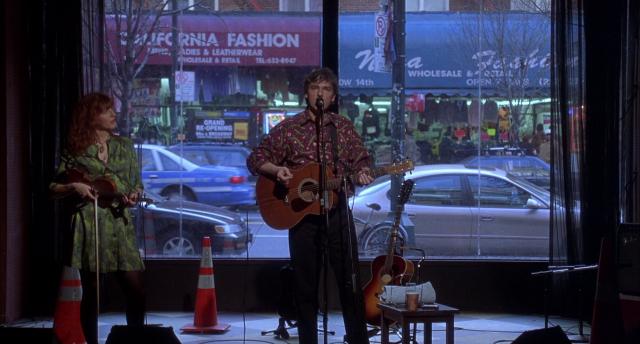
Filmed in 1996 before a small, lucky (unseen) audience in an actual New York storefront, this brilliant little piece — combining the best of Jonathan Demme’s earlier Stop Making Sense and Swimming to Cambodia, really — scuffled around a couple of festivals, but vanished into the whirlpool created by the sinking of its distributor, Orion. Until February 2000, when it finally made its way to video (the soundtrack album had come out in 1998), few people had seen it, and even today few people know it exists. It’s nowhere to be found among Roger Ebert’s online reviews or in Leonard Maltin’s Movie and Video Guide. It desperately deserves to be rescued from oblivion.
If you’re not a Robyn Hitchcock fan prior to seeing Storefront Hitchcock, chances are you will be when it’s over — unless his elliptical lyrics (and even more elliptical between-songs patter) aren’t your cup of tea. Hitchcock plants his feet firmly (no Neil Young-style moshing for him — he scarcely moves) and runs through 14 songs, some old, some new, all his. (None of his standard Byrds or Dylan covers here. A good chunk of them, by the way, are off recent discs like 1996’s Moss Elixir and 2000’s Jewels for Sophia and A Star for Bram.) He seems a little ill at ease with the camera — he glances at it probably at least once a song — which is okay with me; as an artist whose MTV output has been, shall we say, slim, he simply may not be used to the camera eye. The effect is to humanize him a bit, to soften him (and he can seem aloof at times — but then, so did David Byrne).
Hitchcock goes unplugged for more than the first half of the film, accompanying himself with harmonica on the first song (“The Devil’s Radio,” an apparent broadside at Rush Limbaugh and his ilk) and the last (“I Don’t Remember Guildford,” during the closing credits). About 40 minutes in, he switches from acoustic guitar to electric. Aside from occasional backup — the charismatic, smiling violinist Deni Bonet on two songs (the elegiac “Filthy Bird” and the exuberant “Let’s Go Thundering,” as close as Hitchcock ever gets to unabashed romance), the bashful-looking Tim Keegan on guitar and vocals (Keegan seems even more camera-shy than Hitchcock) on “Alright Yeah” near the end — this is a one-man show, with very little cinematic flash. What makes the movie so refreshing is that very lack of flash — plus the novelty, these days, of hearing pop songs with an actual melody. Hitchcock, before anything else, is a superb pop songwriter, marrying catchy hooks to lyrics that range from clever to beautiful to downright weird. A highlight is Hitchcock’s famous “The Yip Song,” a tribute to his late father, with one subtly superimposed line over his shoulder that clarifies the song’s poignant meaning for those unfamiliar with Hitchcock’s bio.
Towards the end, possibly getting restless, Demme lapses into a couple of mannerisms he would seem to be above. He goes for a quadruple-screen effect in one song; in another, the camera moves in close and editor Andy Weir does some attention-deficit-disorder cutting. Even here, though, Demme does this stuff better than any MTV hack who tries it. With the quadruple-screen segment, for instance, you realize that Demme is in effect inviting you to edit the number yourself by choosing which screen to look at and when. (An interesting precursor to Mike Figgis’ Time Code.) Anthony Jannelli’s photography is razor-sharp, and receives a rich transfer on the DVD (which is, sadly, utterly bereft of extras).
Overall, this is the companion piece to Stop Making Sense we’ve been waiting for. Hitchcock even references David Byrne in one of the songs, and frequent Demme producer Kenneth Utt makes his obligatory cameo: a man on the street outside holds an enlarged photo of Utt up to the storefront window during “1974.” Demme keeps the frame (unfortunately the disc isn’t letterboxed) well-stocked, but never cluttered, with a variety of backdrops — translucent window covers of different colors, candles, a lightbulb, disco ball, even a big tomato. The best backdrop, though, is the street behind Hitchcock, where we occasionally see passersby peering inside. One of them, if you look closely, is carrying a guitar and turns out to be Tim Keegan.





